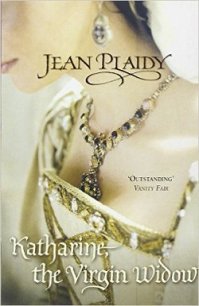The Sun in Splendour - Plaidy Jean (электронную книгу бесплатно без регистрации .txt) 📗
'May he have good sport with her. It will put him in the right mood when I ask for Calais for Anthony.'
'I hear that Hastings found her, boasted of her and so the King saw her.'
'I wish Edward would not be so friendly with Hastings.'
'Hastings is a rake of rakes, second only to the King.'
'I know. I should like to remove Hastings. I will, one day. But the least little whisper against him and the King shuts his ears. You know I never impose my feelings on Edward ... at least not so that he will know . . . so it is hard to tell him what I think of Hastings.'
'Hastings has been a good friend to him. I daresay Edward is more friendly with him than with anyone. He is closer to his brother Richard perhaps, but in a different way. Richard is his loyal henchman. Hastings is his companion in profligacy.'
'Undoubtedly so. I believe there would not be so many of these adventures with merchants' wives but for Hastings. Hastings shows what a fine fellow he is with the women and Edward regards it as a challenge. How I wish I could break that friendship!'
'There is no need to tell you to go carefully,' said Jacquetta, 'for you always do.'
'Always,' replied Elizabeth. 'But when I make up my mind I usually get what I want in the end. Desmond thought he was very clever. . . but look what happened to him. I sealed his death warrant while Edward slept. He must have known it was done . . . yet he said nothing and he was quite fond of Desmond. Mother, what has happened to you?'
Jacquetta was lying back in her chair, her face deathly white, her lips blue.
Elizabeth rose in horror and summoned her women to come at once.
They took Jacquetta to her bed and Elizabeth immediately sent for the doctors.
Her mother was very ill and had been so for some time, they told Elizabeth and the manner in which they spoke alarmed the Queen. Jacquetta looked so wan now that she was lying in bed and was no longer pretending that this was just a slight indisposition. She took Elizabeth's hand and looked at her appealingly, almost apologetically. She was thinking: Perhaps I should have told her. It would have been better to have warned her rather than give her this sudden shock.
But Jacquetta had known how unhappy that would have made
her daughter and she could not bear to disturb her with impending tragedy. She had worked for Elizabeth, lived for Elizabeth as she did for all her children and her great fear now was that Elizabeth would miss her.
There was little time left, she feared. At least she had seen her daughter safely on the throne; she had seen the rest of her children make brilliant marriages and take up important posts. The most influential family in England had ceased to be the Nevilles and had become the Woodvilles. She need not have worried about Elizabeth and this Jane Shore. Elizabeth knew how to handle the King.
So Jacquetta could say: Lord now lettest thou thy servant depart in peace.
My house is in order, she thought. She died peacefully in her bed a few days later.
Elizabeth was stricken with grief. Devoted to her family as she was, she loved her mother intensely. She saw in her the wise woman, the founder of their fortunes.
And now . . . she was dead.
Elizabeth remained deeply affected. Cold she might be to the world but she was devoted to her family and she had always been particularly close to her mother but only now did she realize how much she had meant to her. Edward was sympathetic. He too had been fond of Jacquetta but it was characteristic of him that he avoided unpleasantness. He preferred to forget rather than to brood.
As the weeks passed she saw less of him. Perhaps he was completely entranced by this new mistress. That might be a bad or good sign. She was not sure which. It was sometimes better for a king to have one mistress than many; yet on the other hand if he became too devoted to the woman, might not his love for his wife wane a little?
Elizabeth was determined that it should not. But she realized that with such a menace as the goldsmith's wife she must tread more warily than before.
He was as loving as ever when he came to tell her that Louis of Bruges, Lord of Gruthuyse, who had sheltered him when he had been obliged to fly to the continent and had therefore proved
himself to be such a good friend, was to visit England. Edward wanted him to be entertained with all the splendour of which the Court was capable.
Elizabeth threw herself into making the arrangements. It helped her forget the loss of her mother and the health of baby Margaret which was growing less and less sarisfactory; moreover it kept the King at her side.
When de Gruthuyse arrived at Calais he was welcomed by Lord Howard who was the deputy Captain and there he remained for nearly fourteen days while he was entertained with every show of honour and respect. In due course he arrived at Windsor where the King was waiting to greet him. Edward conducted him to the Queen's apartments assuring him of Elizabeth's impatience to greet him and to thank him in person for his goodness to Edward during his enforced absence from England. It was at such times, Edward commented, that a man discovered his true friends.
Elizabeth, prepared for the coming of this honoured guest, was waiting, looking very beautiful, her golden hair loose about her shoulders and a circlet of jewels about her forehead. She was gratified to see Edward's eyes gleam as he looked at her and she asked herself what she had to fear from any merchant's wife. She had been playing at morteaulx, a bowls game, with her ladies while waiting, and her eldest daughter was present. Like all the royal children six-year-old Elizabeth was very good-looking and there was no doubt of Edward's pride in his wife and daughter when he presented them to the Lord of Bruges.
There followed dancing and games in which the King joined and during the dancing he took the young Elizabeth as his partner at which everyone applauded.
The next morning de Gruthuyse must meet the Prince of Wales and the little Edward was carried in by Thomas Vaughan his chamberlain, and when de Gruthuyse had complimented the King on his charming family, Edward presented him with a gold cup which was decorated with pearls, and on its cover was an enormous sapphire. Nothing was spared in the entertainment which went on for several days. There was hunting in Windsor Park when the King insisted on his honoured guest riding his favourite horse; and when de Gruthuyse was seated on it he was informed that the horse was his. Not content with giving his friend these valuable gifts Edward also presented him with a
crossbow and silk strings and a cover of velvet for it which was embroidered with the King's arms and devices.
De Gruthuyse particularly admired the rose-en-soleil which combined the White Rose of York with the blazing Sun and, as Hastings had done, likened the King to that very sun. 'You are the sun of your people,' he said. 'You have brought them peace and prosperity. They bask in your radiance.'
Edward graciously accepted the compliment for indeed it seemed to him that it was so.
There at Windsor de Gruthuyse was given his own apartments which were called chambers of pleasance; the walls were hung with silk and there were carpets on the floors. There were three chambers and in one was the bed which had been prepared for him. The down was of the best; the sheets of rennes and finest fustian and the quilt of cloth of gold, edged with ermine. The tester was of the same cloth of gold as the quilt and the curtains of white sarsenet. In the second chamber was another fine bed and in the third chamber two baths which were covered with white cloth in the shape of tents.
The whole company escorted the visitor to these apartments and there they left him with Lord Hastings who would stay with him for the night, to care for his comfort in the name of the King. Hastings was, of course, well known to de Gruthuyse and had reason to be grateful to him as had the King, for Hastings had enjoyed hospitality at Bruges when he had shared the King's exile.




